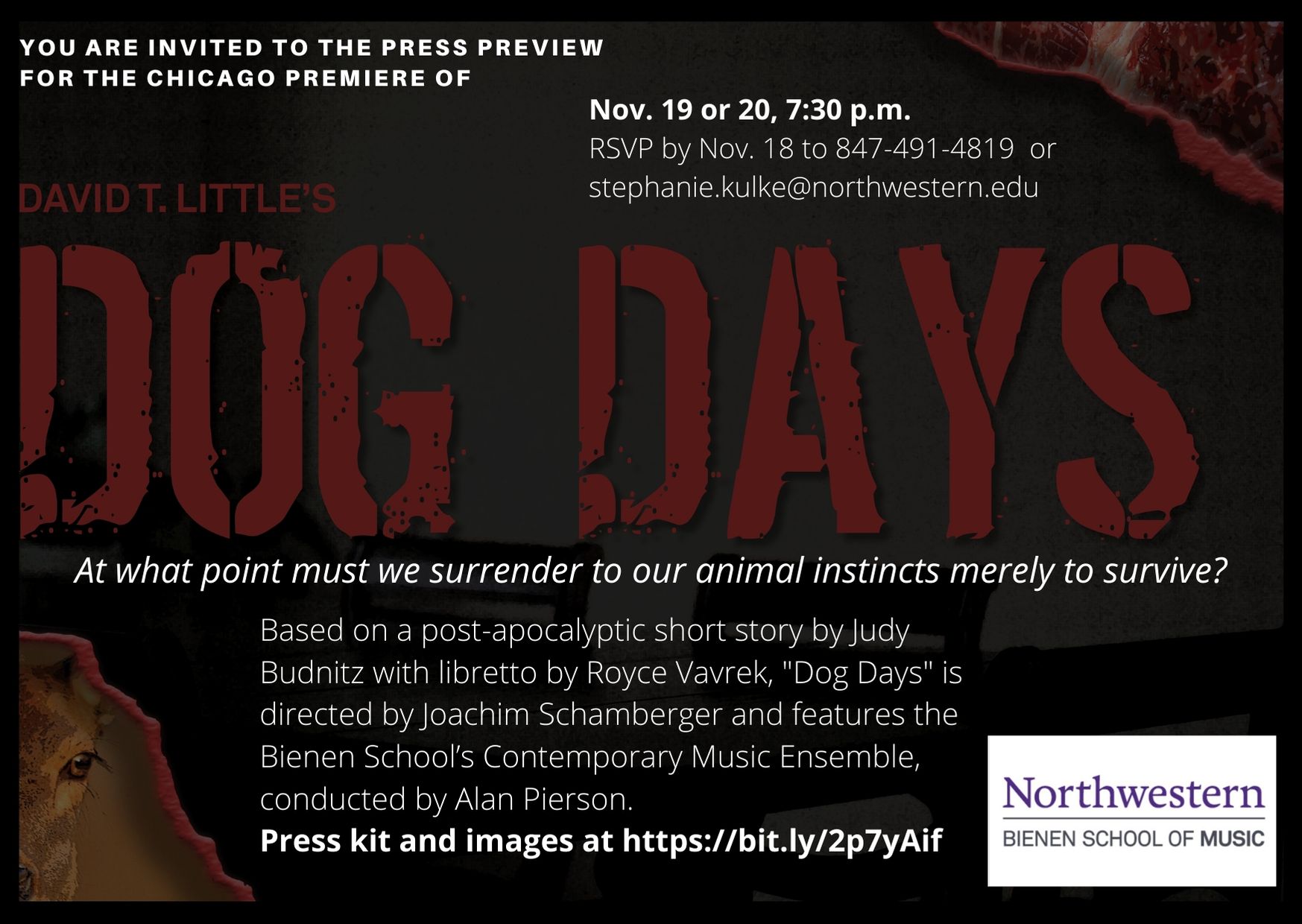
[rating=3]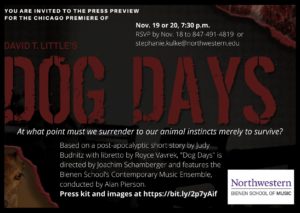 Currently premiering at the Ryan Opera Theater at Northwestern University is “Dog Days,” the first collaborative effort between Northwestern’s Institute for New Music and the opera program at the Henry and Leigh Bienen School of Music. “Dog Days” is a one-of-a-kind opera, a disturbing, shocking, and gritty story of survival that is not easy to watch. The genre is post-apocalyptic horror, and the libretto by Royce Vavrek is based on Judy Budnitz’s dystopian short story by the same name from her 1998 collection Flying Leap.
Currently premiering at the Ryan Opera Theater at Northwestern University is “Dog Days,” the first collaborative effort between Northwestern’s Institute for New Music and the opera program at the Henry and Leigh Bienen School of Music. “Dog Days” is a one-of-a-kind opera, a disturbing, shocking, and gritty story of survival that is not easy to watch. The genre is post-apocalyptic horror, and the libretto by Royce Vavrek is based on Judy Budnitz’s dystopian short story by the same name from her 1998 collection Flying Leap.
The underlying tale is about a rural American family’s lengthy descent into a hellish, nerve-jangling reality sometime in the near future. Threatened by war, five family members find themselves with less and less food and no electricity or gas to heat their home. The father a/k/a Howard (Jeffrey Goldberg, with his resonant baritone voice) has to take out his gun and shoot critters so that everybody can eat. Although the U.S. military provides the family with aid packages as airdrops to keep them alive, the rations become insufficient as America is apparently losing the war. Despite the fact that the enemy can provide some, if not all, the family members with food, they prefer to remain in their home rather than join up with opposing forces. Howard has less and less to hunt as there are no animals left. As everybody is being starved out, the family is plunged into eating grass and the occasional mushroom.
At the beginning of the performance, a homeless man appears on the family’s doorstep. He wears a dog suit and acts like a dog. What an exceptional performance by Morgan Mastrangelo, who plays Prince; his acting deserves a Tony Award! Mastrangelo’s portrayal of the dog-man, with his huge soulful eyes and his scraggly hair and beard—plus the occasional bark and scratch—could not have been done any better! Family members make fun of him, call him a retard and other abusive names. Howard wants to shoot him as a trespasser who could cause trouble but later insists on wanting to make him a man by forcing him to stand up on two legs; yet Howard is repulsed when the dog-man refuses to become fully human. For much of the opera, one never understands why Howard keeps changing his mind about the dog-man. Perhaps this may have to do with the fact that his daughter Lisa (Olivia Prendergast) befriends the strange “dog”, whom she names Prince, and that her mother (Emma Rothfield, an enthralling soprano) supports this. Lisa is anxious to make a new friend since her last friend Marjorie moved away—or perhaps something worse has happened to Marjorie, considering that people who had once lived around them disappear mysteriously.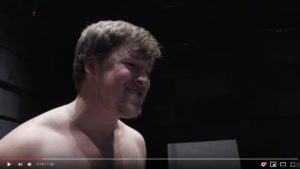
The ominous tale nicely resolves with an ending that is both haunting and meaningful. However, as the characters ruminate about their horrific predicament, certain operatic laments about mundane life, such as requiring deodorant and copulation, left me flat. I also wasn’t too pleased about watching routine bodily functions at the very beginning with the father urinating into the toilet at the same time as the homeless dog-man is doing the same on their lawn. Was that a portend of things to come? Of course, the point was to draw parallels between the two men: what one is and what one will become. The performance also shows us how people try to retain some sense of normalcy in lives punctuated by degradation. So when the two teenage sons (played by Pablo David Laucerica and David Fleming) look at porn magazines and when the pubescent Lisa looks at herself in the mirror and sees herself as becoming a young woman, these moments of healthy sexuality help to counteract some of the grim realities being depicted.
Special recognition must be made of Aryssa Burrs’ forceful performance as the captain. Her singing was chilling and extremely effective.
One of the best parts of the whole performance is the innovative and foreboding music that accompanies every scene and that follows practically each the actors’ movements. Composer David T. Little is the sheer genius behind it all! His awe-inspiring score evokes fear and dread among audience members and provides us with an essential thread that ties the story together. I can see why the Northwestern music students are so proud of having him as their composer-in-residence! Further, the Bienen School’s Contemporary Music Ensemble, conducted by Alan Pierson, does a marvelous job behind the scenes performing Little’s music. One should see this production if just for that.
Problematic were elements of the sound design. The special sound effects were great and very appropriate, but the mix was lacking—or something just wasn’t just right. The words being sung were very clear much of the time but sometimes not so much. It didn’t seem to matter who was doing the singing. In fact, the vocals were almost too loud. In the second act, as the intensity grew, it was not so important to hear all the words, since the action spoke for itself. Though the plot remained understandable and the characters strong, some amount of passion was lost in this lack of articulation. Hence the show descended into watching a silent movie with sound behind it.
Another wonderful feature of this production is the set, resembling a dilapidated doll house. This is the work of properties designer and scenic artist Tim McMillan. The multi-level structure and its lifelike exterior complete with front lawn allows us to watch the action happening in different rooms simultaneously, thus creating meaningful coincidences and heightening the plot.
Pulling all of this together is director Joachim Schamberger. While the forceful voices, brilliant instrumental music, and fine set design—combined with wonderful acting and singing—should make for a great show, the elements are too disparate and the story just a bit too depressing. Maybe the performance is fifteen minutes too long, and watching a shorter version would be fifteen minutes of feeling less miserable. Watching the horror of people starving and dying left me drained. There was no call to action, no deeper meaning with the exception of knowing that death is very real and that it is a fate that befalls all living creatures. Though death never makes any sense, some deaths make less sense than others. This has to do with intention: whether we plan to die or choose to die or whether another person intends death or destruction for us or chooses it on our behalf. 
At the very end of the performance, Lisa tears down the backdrop and the audience is able to finally see the live musicians behind it all. This was the only moment when I saw a glimmer of hope. All is not lost. There is life beyond life. The hope is in the music. Death is not a stranger to any one of us, but it is life’s melody and rhythms that help us to get through it all.
The Bienen School’s presentation of “Dog Days” is produced by the Northwestern Opera Theater. The show runs through November 24, 2019.
Performances take place at Northwestern University’s Evanston Campus at the Ryan Opera Theater, located in the Ryan Center for the Musical Arts, 70 Arts Circle Drive. Showtimes are 7:30 p.m. Thursday through Saturday and 3:00 p.m. Sunday.
Tickets are $18 for the general public and $8 for full-time students with valid ID and are available online at concertsatbienen.org, by phone at 847-467-4000 or in person at the Bienen School ticket office located at the southeast entrance of Pick-Staiger Concert Hall, 50 Arts Circle Drive.
Parking is free and ample at the nearby parking garage off Campus Drive.


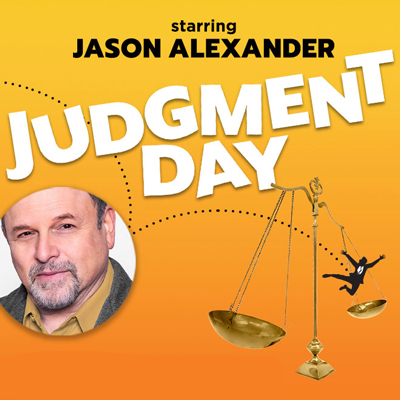
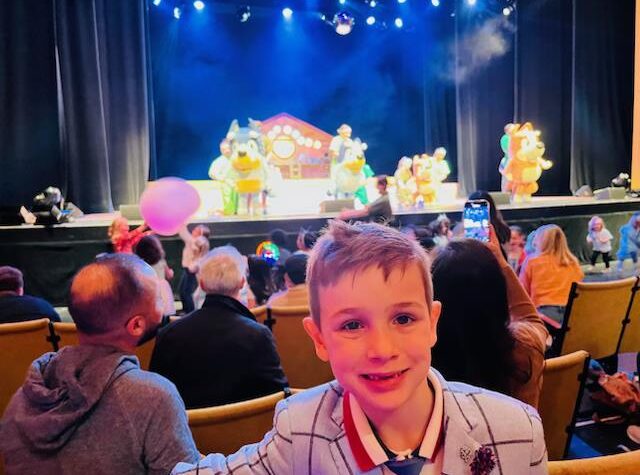


More Stories
“Judgement Day”
“Bluey’s Big Play” reviewed by Tommaso Casati
“Beautiful: The Carole King Musical”